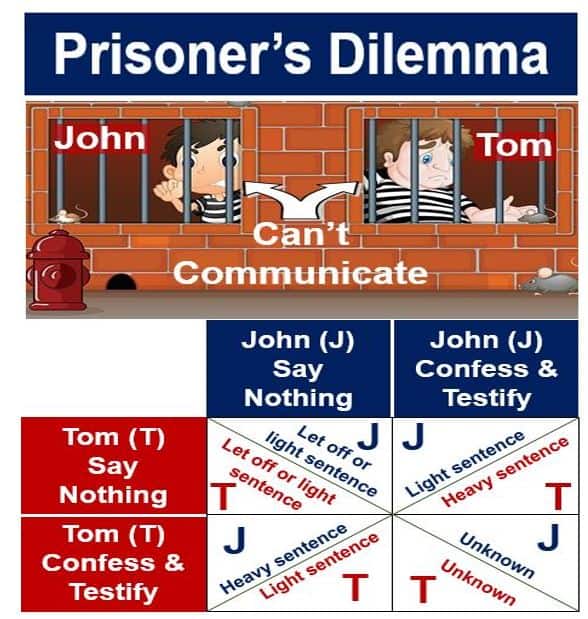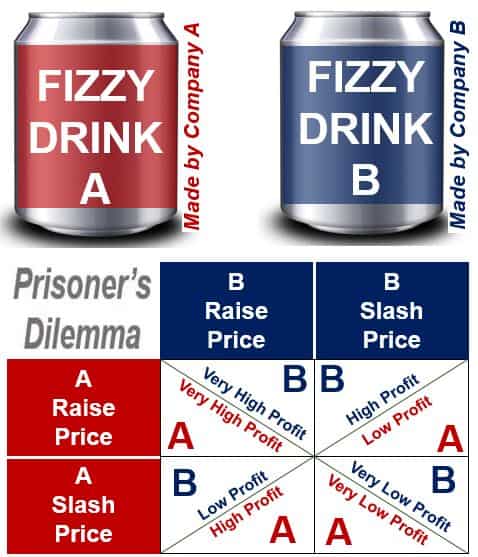What is the Prisoner’s Dilemma? Definition and meaning
Prisoner’s Dilemma is an example given in Game Theory, the study of mathematical models of cooperation and conflict between rational human beings when they make decisions. In this case, the dilemma shows why cooperation is hard to achieve, even when both players would be better off if they cooperated.
In the Prisoner’s Dilemma, there are two people who have been arrested for the same crime. They are held in different prison cells and are unable to communicate with each other.
Examples of Prisoner’s Dilemma
Each prisoner has two choices: 1. Confess to the crime and testify against the other. 2. Keep quiet.
 When there are just two, three or four dominant players in a market, the rivals frequently find themselves in a situation similar to the Prisoner’s Dilemma in this image. As one does not know what the other is going to do, choosing the option that would benefit everybody – if they also chose it – is extremely risky.
When there are just two, three or four dominant players in a market, the rivals frequently find themselves in a situation similar to the Prisoner’s Dilemma in this image. As one does not know what the other is going to do, choosing the option that would benefit everybody – if they also chose it – is extremely risky.
With just these two options, there are three possible outcomes:
- One confesses and testifies: if just one confesses and agrees to testify against the other prisoner as state witness, his sentence will be reduced, but his fellow prisoner’s sentence will be heavy.
- They both say nothing: they may be lucky and either be let off if there is not enough evidence, or get light sentences.
- They both confess: they will probably get a lighter sentence each than keeping quiet and then found guilty after the other one had confessed and testified. However, this one is really an ‘unknown’.
As far as the two prisoners are concerned, the best option is the second – both say nothing.
However, how can one prisoner be sure that the other one will be thinking this? The other one might be super-selfish and decide to confess and cooperate, in which case the first one’s decision to keep quiet would be disastrous.
The two prisoners can go on wondering which is the best option to choose, but without talking to each other it is impossible to know – that is why it is called the Prisoner’s Dilemma.
 Best best option for the two drinks companies is for both of them to raise price – the worst would be if they both slashed prices. They are in a Prisoner’s Dilemma, because they are not legally allowed to arrange high prices together – that would be collusion. The directors would be in serious trouble with the authorities if they were caught.
Best best option for the two drinks companies is for both of them to raise price – the worst would be if they both slashed prices. They are in a Prisoner’s Dilemma, because they are not legally allowed to arrange high prices together – that would be collusion. The directors would be in serious trouble with the authorities if they were caught.
Prisoner’s Dilemma and business situations
Let’s imagine there is a market with just three competitors – an oligopoly. Oligopolies are markets with too few suppliers.
Companies in an oligopoly often find themselves in a Prisoner’s Dilemma type situation – and they behave like the two men in the example above.
If they all got together and cooperated, and promised not to undercut each other, they could raise prices – they would have the power over prices that exists in a monopoly (when there is just one supplier).
However, it is against the law to collude with your rivals on prices, so they cannot meet and talk about this.
If the three competitors cannot talk to each other about pricing strategies, there is no way one can know whether the others will follow it during a price increase – one of the other two might undercut it, or they both might.
By not being able to talk to each other and cooperate – by being in a Prisoner’s Dilemma – the three companies are worse off.
Prisoner’s Dilemma – two rivals
Imagine two drink companies – Coca-Cola and Pepsi – that sell similar products. Each one must decide on a pricing plan (this situation is completely fictitious).
Coca-Cola and Pepsi make the most money when they both charge high prices, and make the least money when they try to undercut each other and prices are very low.
Let’s say they make $10 million each in profits when they both have high prices. If one of them cuts its prices, it initially gains many customers from its rival. Perhaps its profit increase to $11 million, while that of the rival falls to $9 million.
If a price war ensues and they and up with ultra-low prices, they make just $8 million each.
Here, their situation is similar to the one described in the Prisoner’s Dillemma, with a price cut being the equivalent of ‘confessing and testifying’, and the high price equivalent to ‘saying nothing’. ‘Confessing and testifying’ could be seen as cheating, while ‘saying nothing’ is cooperation. When Coca-Cola and Pepsi cheat, they are worse of than if they cooperate. However, if they get caught cooperating, they are in serious trouble with the law.
Prisoner’s Dilemma – the Cold War
When military superpowers find themselves in a Prisoner’s Dilemma, the world becomes a much more dangerous place.
During the Cold War, the United States and the Soviet Union entered an arms race, because one did not know what decisions the other might make.
They would have been much better off if they had cooperated – so would the rest of the world. Eventually the two superpowers did get together, and their Prisoner’s Dilemma was – to a certain extent – alleviated.
Video – Prisoner’s Dilemma – Definition and Meaning
There are many version’s of the Prisoner’s Dilemma. Watch and listen to this one in this Mind Your Decisions video.

